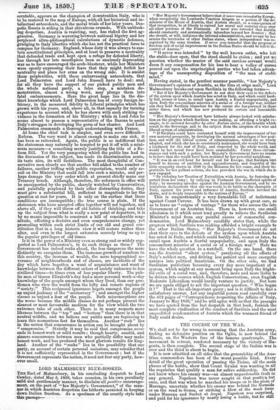LORD MALMESBURY BLUE-BOOKED.
TICE Earl of Malmestnny, in his concluding despatch to Lord Cowley, dated May 5, 1859, takes occasion, in his own peculiarly mild and gentlemanly manner, to disclaim all positive encourage- ment, on the part of " her Majesty's Government," of the milli- ner in which Austrian despotism has hitherto persisted in keeping down Italian freedom. As a specimen of the courtly style take this passage- " Her Majesty's Government believe that it never was Intended by Europe, when recognising the Lombardo-Venetian kiugom as a portion of the do- minions of the House of Austria, that Austria should, as a consequence of that recognition, be at liberty to extend her moral and material sway over all other portions of the Peninsula. It never was intended that Austria should constantly and systematically interefere beyond her frontier ,• that she should, at will, influence the internal administration, and occupy by her armies the territories of other Italian states, whose independence was re- cognized by the same treaties. It never uas intended that the progress of freedom and of social improvement in the Italian States should be left to the control of Austria."
" It never was intended " by the well known ostler, who left the stable-door open, that the steed should be stolen ; and yet we question whether the master of the said careless servant would deem it any compensation for his loss to hear a volley of curses poured out upon the unprincipled parties who had taken advan- tage of the unsuspecting disposition of " the man of stable mind."
Having stated, in the gentlest manner possible, " her Majesty's Government's opinion of Austria, as the fons et ori?o mall," Lord Malmesbury breaks out upon Sardinia in the following terms-
" But if her Majesty's Government do not shut their eyes to the defects of the system upon which Austria has acted in Italy, and which could hard- ly fail, sooner or later, to entail upon Austria a fearful unpopularity, and upon Italy the concomitant miseries of a social or of a foreign war, neither can they hold Sardinia blameless for the course she has pursued in these latter times, and whioh has now produced its certain and lamentable results.
" Her Majesty's Government have hitherto always looked with satisfac- tion on the progress which Sardinia was making, as affording a bright ex- ample, to be imitated hereafter by other Italian states, of the benefits which result to the Sovereign and to the subject from the adoption of a wise and liberal system of administration. " If Sardinia could have contented herself with the improvement of her own material prosperity, by developing the natural advantages of her posi- tion, and with the liberal system of administration, which she so wisely adopted, and which she has so consistently maintained, she would have been a landmark for the rest of Italy, and respected by the whole world, and would by her moral force hare been unassailable. Under those circum- stances and with such a policy, her Majesty's Government have no reason to believe that she would have been molested by her powerful neighbour. " It was in an evil hour for herself and for Europe, that Sardinia lent herself to dreams of ambition and aggrandizement, and forgetful of the little sympathy shown in 1848 by the Milanese for her cause, and their in- gratitude for her gallant actions, she has provoked the war in which she is now engaged. "By violating her Treaties of Extradition with Austria, by fostering de- serters from her army; by rallying in Piedmont the disaffected spirits of Italy ; by menacing speeches against the Austrian Government, and by os- tentatious declarations that she was ready to do battle as the champion of Italy, against the power and influence of Austria, Sardinia invoked the storm, and is deeply responsible to the nations of Europe." This is unquestionably a very formidable bill of indictment against Count Cavour. It has been drawn up with great care, so as to leave no " coigne of vantage " for those who accuse the late Government of an Austrian bias. There is, however, one small admission in it which must tend greatly to relieve the Sardinian Minister's mind from any painful excess of remorseful con- demnation. Lord Malmesbury candidly states that, while the progress which Sardinia was making afforded a bright example to the other Italian States, " Her Majesty's Government do not shut their eyes to the defects of the system upon which Austria has acted in Italy, and which could hardly fail, sooner or later, to entail upon Austria a fearful unpopularity, and upon Italy the concomitant miseries of a social or of a foreign war." Here we have the whole question in a nutshell. On the one hand, there was the Austrian "silent system," paralysing all the efforts of Italy's noblest men and driving less patient and more energetic natures into political fanaticism. On the other side, we find. Sardinian patriotism becoming every day more impatient of a system, which might at any moment bring upon Italy the fright- ful evils of a social war, and, therefore, more and more liable to be driven into courses which English Conservatism, even English Moderate Liberalism would hardly venture to justify. But here we are again obliged to ask the important question, " Who began it ?" That is the all-important query ; nor is it difficult to find a satisfactory answer. Let any impartial person read carefully over the 412 pages of "Correspondence respecting the Affairs of Italy, January to May 1859," and he will agree with us that the passages we have quoted from the last despatch in that book, furnish the most complete vindication of the conduct of Sardinia and the most unqualified condemnation of Austria which the warmest friend of Italy could desire.


































 Previous page
Previous page